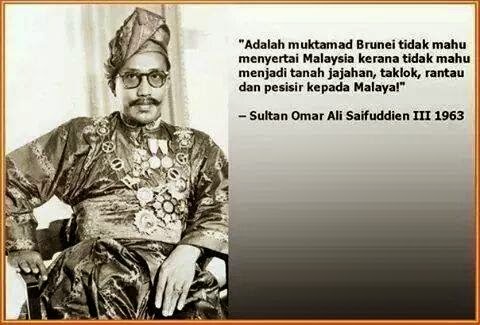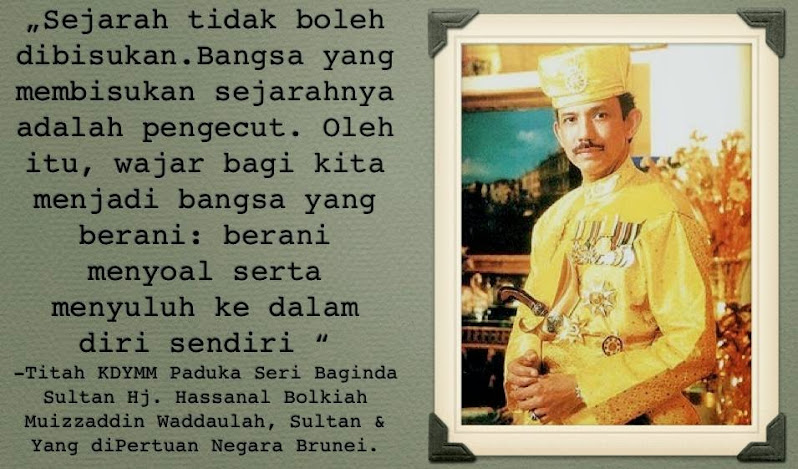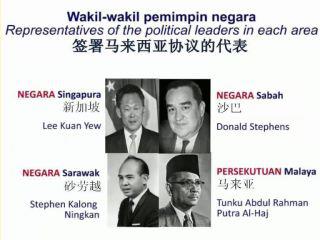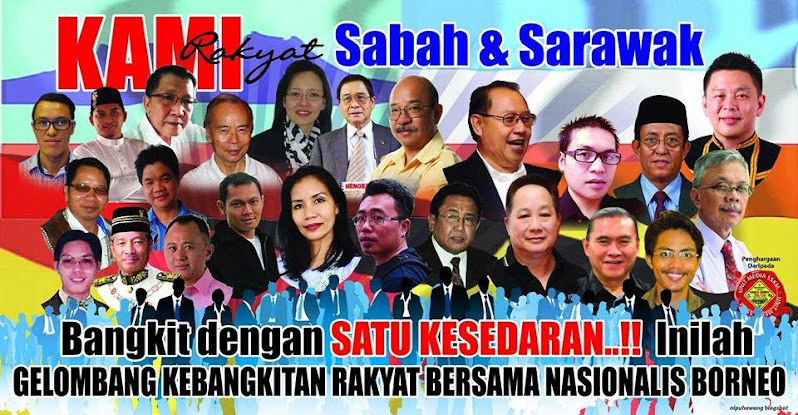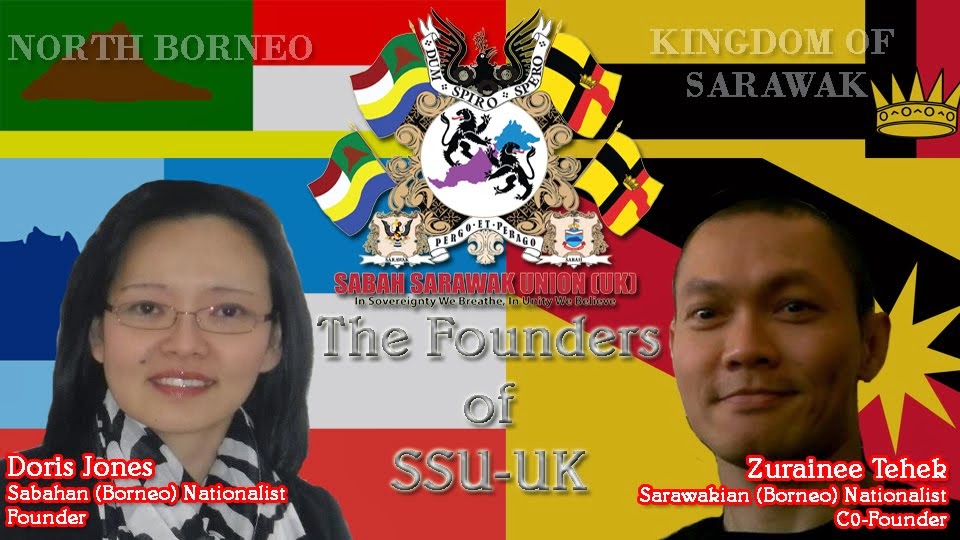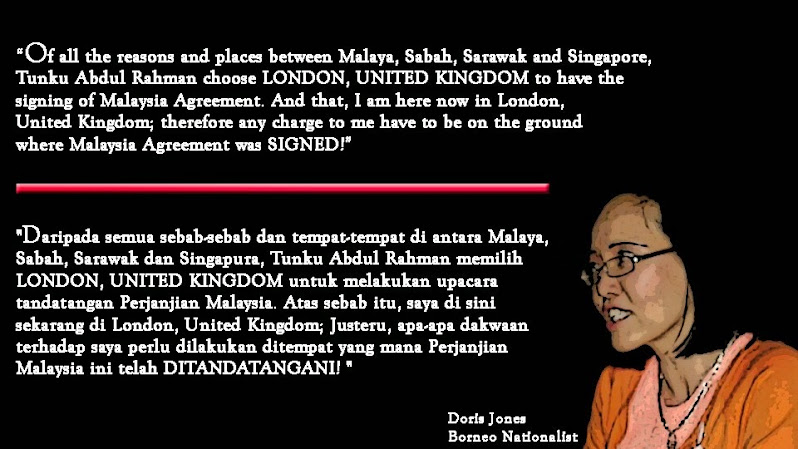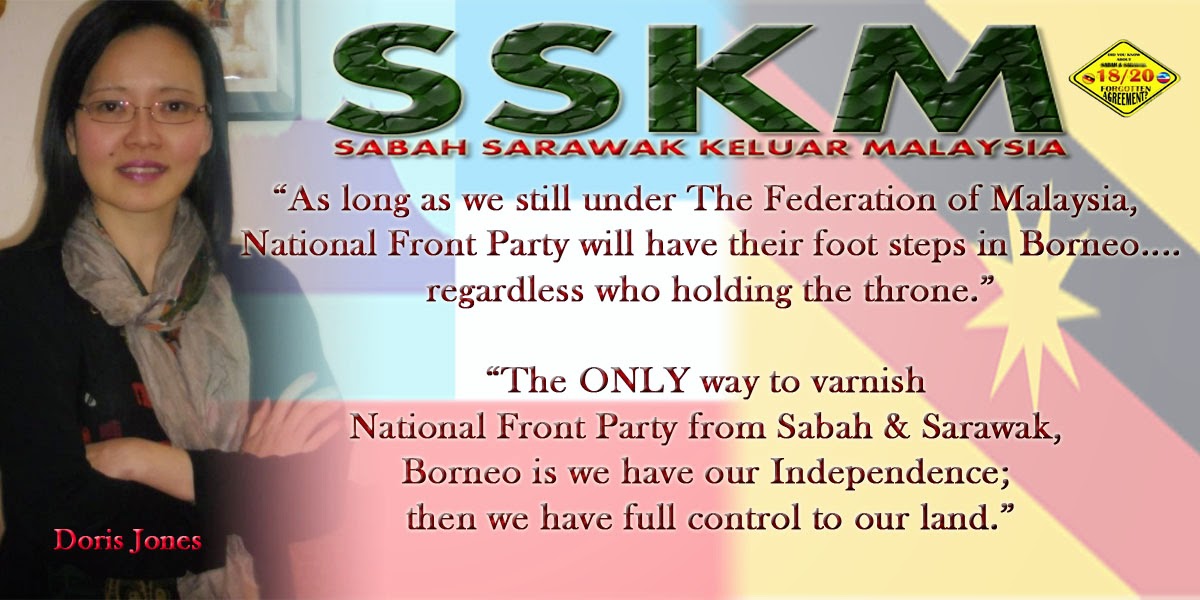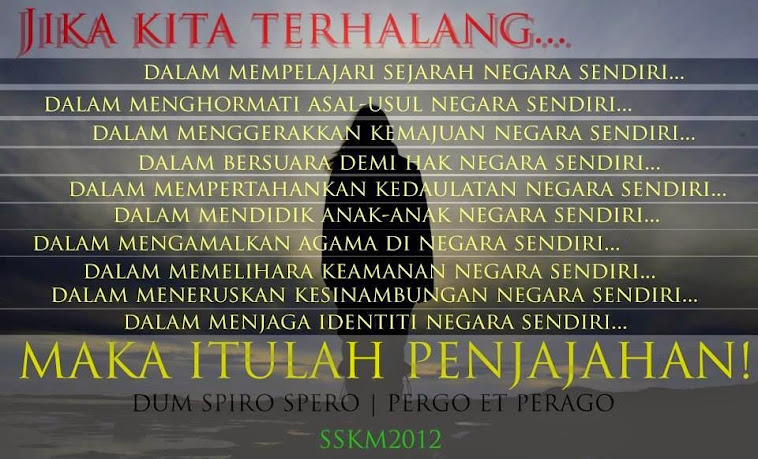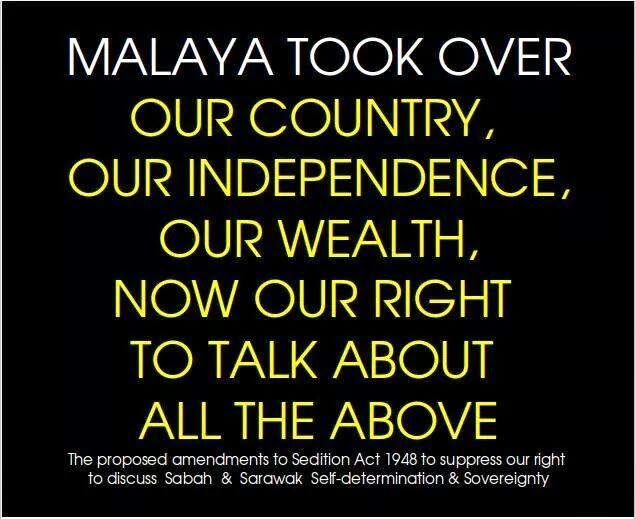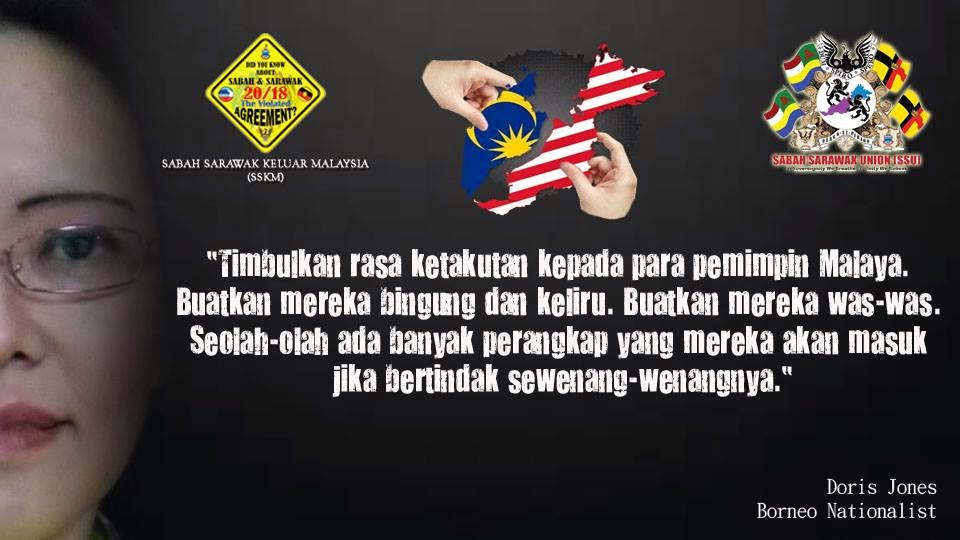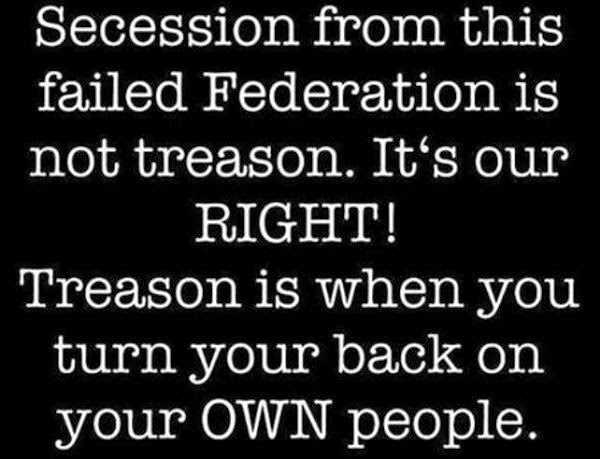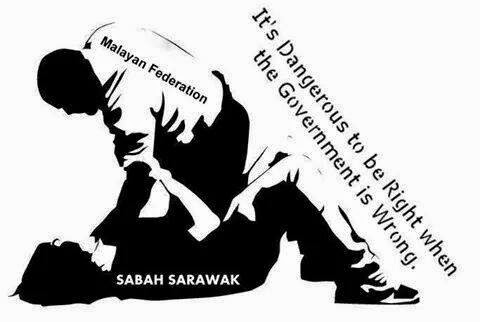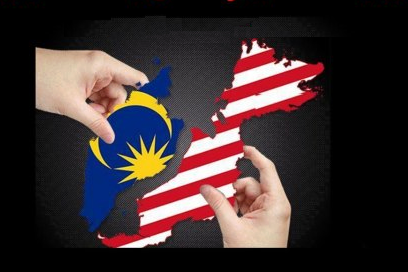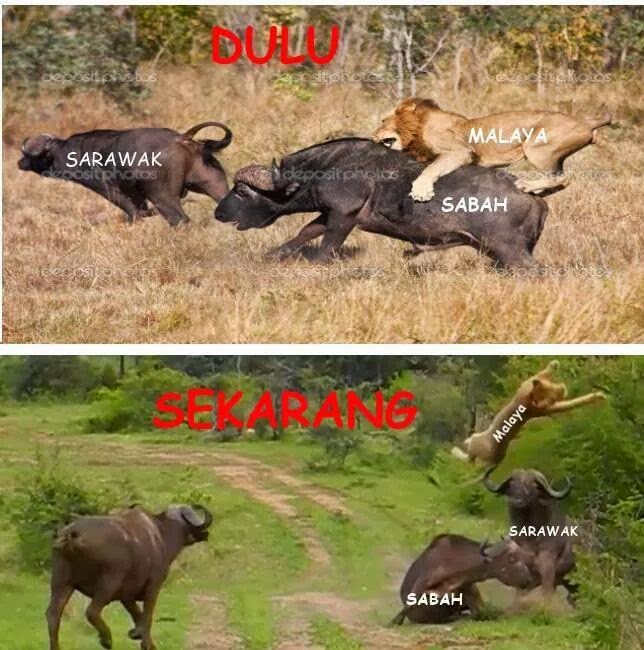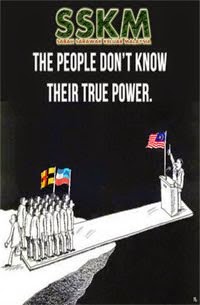Wednesday 17 September 2014
Wednesday, September 17, 2014
Agreement of Malaysia
,
Exposing the Truth
,
Fact
,
Federation of Malaysia 16 September 1963
,
Sabah
,
Sabah Sarawak Union (SSU)
,
Sarawak
,
Secession
,
Self-Determination
,
Separation
,
SSKM
No comments
Pull Sabah & Sarawak out of Malaysia
Sabah and Sarawak is a direct result of poor governance and management of the natural resources in the two countries.
Sabah and Sarawak is grossly under develop
BN led by UMNO has not given priorities to Sabah and Sarawak in development. The education materials used in schools in Malaysia ignore the special status of the countries and their histories. Today – Malaya population refer to Sarawak as another two States in Malaysia when in actual fact, Sabah and sarawak are equal partners in Malaysia.
State Federal relation brought down to the level of the Federated Malay States before Malaysia was formed
All these happened because the Federal governmnet is working slowly but surely to diminish the power of the State government in Sabah and Sarawak.
The perception of young voters
Young voters in Sabah and Sarawak will have to decide on the future of the current based on what lies in ahead for the two countries if it still be part of the Federation of Malaysia.
The promised projects in the various Malaysia’s Plan most of the time never materialized as much fund has been abused and misdirected. The amount allocated are too small while the revenue from Sabah and Sarawak are substantial.
Why is Muslim only allow to lead the government in Sabah and Sarawak?
Basically, UMNO wanted to see only Malay Muslim ruling Sabah Sarawak. It is a form of colonization that the young voters are not happy about.
One thing will lead to another and hopefully some political changes will be made otherwise the future of Malaysia would be a very rough soon.
Election result in not a good indicator
Election result is not a good indication of Sabah Sarawak support for Malaysia because of vote buying and also the poor and deceitful role played by the Election Commission.
Contemplating pulling out of Malaysia
A group of prominent politicians and social activists from East Malaysia are seriously contemplating pulling out Sabah and Sarawak from the Federation of Malaysia.
They are planning to take up their case to the United Nations to hold a referendum on the status of the Borneo states as independent nations.
They no longer want their states to be under the clutches of the Umno-led Putrajaya administration.
No more UMNO rule from Putra Jaya
The group has already sought legal advice from the international community to explore all orderly and democratic means to legally declare Sabah and Sarawak as separate sovereign states.
Sources said the group was keen to avoid any civil unrest, bloodshed and armed conflict with the central government, features usually associated with separatist movements.
“They want to resolve the pressing issue by peaceful and civilised means,” said the source.
Meeting taking place in Indonesia
It’s learnt that about seven representatives from the group met London-based Hindu Rights Action Force (Hindraf) chairman P Waytha Moorthy in Indonesia early this week to discuss the matter.
Sources close to the group said the activists sought Waytha Moorthy’s help to facilitate their imminent representation in the UN.
It’s learnt that Waytha Moorthy had agreed to assist them, with the help of several influential international organisations.
Waytha Moorthy recently facilitated a group of activists to air their grouses and grievances against the federal government at the UK Parliament.
‘Systematic looting and plundering’
The group of activists are deeply perturbed by the federal government’s alleged violations of the states’ rights, interests and benefits for more than four decades since the formation of the Federation of Malaysia in 1963.
“The group is angry over the systematic looting and plundering of the states’ wealth by Umno and its cronies,” said a source.
Sabah, Sarawak, Malaya and Singapore formerly joined Malaysia in 1963. However, Singapore left the Federation in 1965.
To follow Singapore step
The Sabah and Sarawak activists believe that just like Singapore, their states too can pull out from Malaysia.
Sabah and Sarawak are two natural resources rich provinces in Malaysia, with massive wealth potentials in oil reserves and forestry.
However, Sabahans and Sarawakians are convinced that they have remained poor due to the federal government’s “manipulation and usurpation” of their power to self-determine their own affairs.
Unhappy over petro dollars
They are crying foul over the mere five percent royalty cut received for their own oil, while the Putrajaya administration “steals” 95 percent of petro dollars.
“People from both Sabah and Sarawak realise that they are being short-changed. They know there has been daylight robbery of their god-given richness,” said a source.
Another contentious issue is the existence of an estimated 1.7 million illegal immigrants as rightful citizens in Sabah.
Sabahans termed the illegal immigrants, mostly Filipino and Indonesian Muslims, as former premier Dr Mahathir Mohamad’s legacy.
“The government since under Mahathir has systematically brought in these aliens and granted them citizenships. These aliens are now legal MyKad holders in Sabah. It’s absolutely outrageous and ludicrous,” said the source.
The illegal immigrant issue in Sarawak is not as disturbing as in Sabah although it is equally damaging.
‘Raping of forest wealth’
The major issue in Sarawak is the “raping of state forest wealth” by the Umno-backed Taib Mahmud’s government at the expense of the indigenous population.
The natives are also disgruntled by the usurpation of their customary land rights by the authorities despite a recent apex court ruling against it.
Sabahans and Sarawakians are also said to be peeved with the “Malay-nisation and Islamisation” process of their states’ bureaucracy and political systems.
Activists claimed that the federal government had appointed native Muslims to helm various ministerial portfolios and government departments to hasten and fasten this process.
“These Muslim leaders and bureaucratic heads are puppets dancing to the tune played by their masters in Putrajaya,” said the source.
Wednesday, September 17, 2014
Darell Leiking
,
Nationalist
,
News
,
North Borneo
,
Sabah
No comments
What Sabahans want — Darell Leiking
SEPTEMBER 4 — The current culmination of anger leashed out by the Sabahans against the incompetence and inability by the BN Government in governing the State had came to a boiling point that the national BN leaders have finally resorted in threatening the Sabahans with sedition act.
If one analyze the situation logically, it will be clear that these culmination of angers would not be there if the BN government had done the tasks entrusted upon them by the Sabahans in the first place, instead of fighting to ensure its political survival remained intact!
And due to these incompetence and failure by the BN Government to bring forth the daily lamentations made by the Sabahans to the national level effectively and fought for it, this had somewhat created great a division between Sabah and the Federation of Malaysia.
This is evidenced when we speak about the existence of 800,000 illegal immigrants/Project IC holders in the State and the imbalance development/mistreatment of Sabah; a nation which was indeed independent before agreeing to form the Federation of Malaysia.
So, if the BN government had done its job for the past 20 years, Sabahans would be very satisfied with Sabah's position within the Federation of Malaysia and there would be no complaints at all from the Sabahans!
Even the opposition would not be able to wrestle several seats from BN as evidenced in the previous GE13.
What we Sabahan wants from the federal government is plain and simple.
We want Sabah to be recognised as an equal partner within the Federation in whereby, when determining the future of his nation called Malaysia, our opinions, requests and voices must be adhered to since Sabah is one of the 'three shareholders'.
For example, did the federal government taken into the consideration the call by the Sabahans for equal distribution of Parliamentary seats between Malaya, Sarawak and Sabah over the seats previously allotted for Singapore?
And whenever Sabahans spoke of any issue such as the oil royalty review or Borneosation, the BN Government would be quick to hide behind its usual cover line of 'we don't bring issues in the open; we discuss about it during our meeting'.
Any minister or representative must discuss his/her party's issues during their party's meeting BUT there is no reason for them not to educate and inform the Sabah's younger generation openly of what is rightful belongs to our State !
Even the RCI report on the existence of the illegal immigrants in Sabah is not forthcoming when Sabahans are eagerly waiting for it despite the fact that Sabahans are the ones who paid the costs for the hearing through the peoples' funds known as taxpayers money.
Thus, the culminating resentments and angers felt by the Sabahans towards the nonchalant attitude by the BN government over all these issues have somewhat come to a point that ordinary and non-partisan Sabahans decided to take things at their own hands by educating and spreading the awareness relating to Sabah such as the Birth of Malaysia, the 20 Points and Sabah's special rights and privileges which were imbued in the Malaysian Agreement 1963.
And several politicians (including myself), activists, scholars, academicians and non-partisans have taken part in several forums to share our thoughts, opinions and so on relating to these pertinent issues that some of these forums have unbelievably been regarded as 'seditious' in nature by some quarters.
Why is it seditious in nature to speak and discuss about the special rights and privileges held by Sabah which have been acknowledged by the signatories to the Malaysian Agreement 1963 in the first place or even the mistreatment felt by the Sabahans all these while?
I believe that even some of the members of the BN government may also support our call for a more autonomous and respected Sabah but due to pressure upon them (for reasons known only to them) or even the threat of causing seditious remarks, they may have unfortunately unable to realize the wishes of Sabahans
In the case of Tan Sri Simon Sipaun, a Pro BN NGO had made a police report against him when the former had only shared his experience as a junior civil servant during the British administration and not in any way belittle any of the previous effort by those who fought for the independence of Sabah.
While there has been many insensitive comments made in the past by several BN state leaders, this act of making the police report is a show of arrogance beyond comprehension shown by an NGO that I myself could not believe is happening in this State.
Why would anyone make a police report against a retired civil servant (who had given his entire life for Sabah) who merely made a comparison relating to the governance between the past and present administration?
I myself do not believe in secession as I believe that prosperity and security within the scope of an autonomous and equal governance of Sabah in the Federation as envisaged during the formation of Malaysia is what Sabahans really want and this vision was equally felt and shared by some of our previous State leaders.
I stand by Tan Sri Simon Sipaun and whatever effort by the BN government to intimidate or suppress the determination and spirit of the ordinary Sabahans to ensure that the special rights and privileges held by Sabah will fail.
Just attend to the demands that Sabahans wanted.
Jones told not to propagate idea of Sabah, Sarawak leaving Malaysia
KUCHING: Deputy Home Minister Datuk Seri Wan Junaidi Tuanku Jaafar believes that the creator of Sabah Sarawak Keluar Malaysia Facebook Group, Doris Jones, is not in the sedition probe list.
However, he warned that if Jones carried on with her action and words in propagating Sarawak and Sabah leaving Malaysia, there would be consequences.
“Not that I know if she is under the sedition probe but if she continues with her action and words about breaking the country apart, she must know that she is not above the law,” Wan Junaidi told The Borneo Post yesterday.
Uncertain whether the police had made any contact with her, the Santubong MP said Jones “should know better than getting involved in matter she is ignorant of” and that “ignorance of the law is no excuse”.
Sabah-born Jones has set up the facebook group in August 2011 to advocate the secession of Sarawak and Sabah from Malaysia. She said her campaign had grown in the last four years as more people from the younger generations were reacting positively while the senior ones were catching up.
In an email reply, she told The Borneo Post that she started the Facebook group to run a campaign of awareness among the people of Sabah on injustice and human rights violations.
“In reaction to this campaign for awareness, against injustice and human rights violations, the Malaysian Government has decided to put my name onto the list of those falling under (committing an offence) the Sedition Act.
“I am also disappointed that Sabah police chief Datuk Jallaluddin Abdul Rahman has come out with a false statement about his team having tried to make contact with me but have not received any response. That was a lie. No one has contacted me in person or by any other means,” she said.
She was referring to Jallaluddin’s statement that the police had tried to make contact with her but she was not responsive.
“In this regard, I insist that Datuk Jallaluddin or representatives of the Malaysian government present the evidence and I will challenge him and the Malaysian government in the United Kingdom court.
“We should not be afraid of the truth and justice should not be denied,” said Jones who is believed to be a wheel-chair bound lawyer living in the UK.
She said she personally did not agree with the Internal Security Act (Malaysia) and Sedition Act (Malaysia) as both were violations of human rights.
Wednesday, September 17, 2014
Exposing the Truth
,
Fact
,
Jeffrey G.Kitingan
,
Nationalist
,
News
,
North Borneo
,
Sabah
,
Sharing
,
STAR
No comments
Preventing Sabahans from visiting Batu Sumpah on Malaysia Day a blatant dishonour and disregard
Why Are Federal and Sabah Govts Preventing Malaysia Day Commemoration at Batu Sumpah? Questions Dr. Jeffrey
KOTA KINABALU - “Why are the federal and Sabah governments preventing Malaysia Day commemoration at the Batu Sumpah on Malaysia Day? It is disappointing to see the police personnel turning out in full force with their Black Marias reading to stop and arrest the people from performing their commemoration rituals at the Batu Sumpah” said Datuk Dr. Jeffrey Kitingan, who with a large crowd of hundreds who were prevented from entering the Batu Sumpah compound on Malaysia Day.
Officially, the governments are celebrating the 51st anniversary of the birth of the Federation of Malaysia but their actions at Batu Sumpah run smack of a blatant dishonour and disregard of Sabahans and the real Malaysia Day.
It was Sabahans in the Interior who had erected the Batu Sumpah Oath Stone and pledged their loyalty to the Federation in return for the assurance that the Federal Government will honour religious freedom (no official religion), land, forest and natural resources belongs to Sabah and the native customs, adat and traditions will be safeguarded.
By preventing the commemoration ritual, both the federal and Sabah governments are not recognizing Malaysia Day and dishonouring the native customs, adat and traditions.
The governments did not erect the Batu Sumpah monument and the Batu Sumpah does not belong to the government.
Indirectly, the federal and Sabah governments are dishonouring and disregarding the basis of the formation of Malaysia. If not for the basis of the assurances and guarantees as etched in the Batu Sumpah monument, Sabahans would not have agreed to merge with Malaya, Sarawak and Singapore to form Malaysia in 1963.
With the show of force by the police and the actions of the governments to dishonour Malaysia Day and disregard the basis of the formation of Malaysia, Sabah leaders ought to take time out and ask themselves whether there is any more basis for them to support the federal and Sabah governments and for Sabah to continue to remain in the Federation.
Sabah does not belong to the federal government or the Sabah BN government.
The REAL story of May (Part 3/3)
They say those who forget history are doomed to repeat its mistakes. In light of the recent sabre-rattling by those in Umno and the warning by the Armed Forces Chief, Malaysia Today feels compelled to republish an old article by Raja Petra Kamarudin that was published in Harakah on 24 September 1999.
NO HOLDS BARRED
The move to push Tunku Abdul Rahman aside had started. They needed something to trigger off some form of resentment against the government. They needed the Malays to rise, and what better platform to exploit than a racial platform?
Prior to that, 11 Chinese prisoners were sentenced to death for killing a Malay prison warden in Pudu Jail. This was subsequently turned into a Malay-Chinese issue.
The Malays wanted the 11 Chinese punished. The Chinese wanted their death sentence commuted. And demonstrations were held in the Chinese dominated areas around Kuala Lumpur to pressure the government to pardon the 11. In one large demonstration outside Pudu Jail, the riot police had to be called in the break up the demonstration with teargas. That was my first experience with teargas, and I was only 19 then.
The government had no choice but to back down, thereby angering the Malays.
In another incident, some Chinese demonstrated in front of the United States Information Service (USIS) office and one demonstrator was shot dead by a panicking Malay policeman -- interpreted as another Malay-Chinese thing.
The Chinese wanted a funeral procession but the police would not grant them permission as they knew it would attract a huge crowd and the funeral would be turned into a demonstration instead. Tun Razak, however, told the police to grant them permission and ordered the police off the streets. The resulting "giant" parade built up tensions further.
The May 1969 General Elections were held soon after and the Alliance Party won only 40% of the votes resulting in it losing its two-thirds majority in Parliament. It also lost a couple of states to the opposition plus its two-thirds majority in others.
The opposition parties held "victory parades" which turned into a mud-slinging and name-calling session. The Malays were now really angry and decided to hold a victory parade of their own. Dato Harun, the then Chief Minister of Selangor, was given the task of managing this "event".
On May 13, the entire cabinet withdrew to Frazers Hill while the Malays prepared for trouble. People in the top echelon of the government and commerce were tipped off to get out of town or go home early and, by 3.00pm, the city was quite deserted of the elite except for the unknowing rakyat.
That same evening, racial riots exploded. Parliament was dissolved, thereby saving the Alliance government that no longer had a majority in Parliament, and power was transferred to Deputy Prime Minister Tun Abdul Razak under the National Operations Council (NOC).
The Tunku was now powerless.
Mahathir then increased his attacks on the Tunku using race as his platform. He also called for MCA's expulsion from the Alliance to "punish" the Chinese. Instead, Dr Mahathir was expelled from Umno as the Utusan Malaysia newspaper report of 6 June 1969 reveals:
***************************************************
KUALA LUMPUR 5 June - Some leading members of UMNO's Supreme Council have voiced their support for the decision by MCA leadership to exclude themselves from the Cabinet. Among them are Tan Sri Syed Jaafar Albar, Dr. Mahathir bin Mohamad and Syed Nasir bin Ismail.
In a meeting with Utusan Malaysia, Tan Sri Syed Jaafar emphasised his disapproval of efforts made to ask MCA to re-enter the Cabinet.
"I do not agree with the way some Chinese chambers of commerce have stated their confidence and support of Tun Tan Siew Sin and their asking him to reconsider MCA's decision to withdraw from the Cabinet," he said.
According to him, the problem now was not the question of confidence towards Tun Tan Siew Sin as the MCA leader, but whether the Chinese supported the present policies of the Alliance.
"This is the matter that should be considered by these people who are making a big fuss about giving their support to Tun Tan Siew Sin today," he added.
Tan Sri Jaafar Albar also stated that the support given to Tun Tan Siew Sin by the Chinese Chambers of Commerce was not sufficient because support had to come from the majority of the Chinese population.
He stated that discussions about MCA's inclusion in the Cabinet should not be confined to the newspapers or to MCA alone because UMNO, as the backbone of the Alliance party, had not decided yet if MCA and MIC should be included in the Cabinet or if the Alliance should remain as it was then.
He said: "It is not only the duty of MCA to discuss this matter as if it is its own peculiar problem, but it should be the responsibility of all the Alliance leaders from the UMNO, MCA, and MIC."
However, he did not want to give his final views before the party met to discuss the matter.
Mahathir, who supported Tan Sri Syed Jaafar's statement, stressed that MCA leaders had to adhere to their earlier decision of not wanting to be included in the Cabinet.
He said that he agreed with the view of MCA leaders that they could not actually represent the people they claimed to represent.
According to Mahathir, the support given to Tun Tan Siew Sin by the Chinese chambers of commerce and other Chinese organisations could not be taken as support from the Chinese community as a whole to MCA because those organisations did not represent the desires of the Chinese community as a whole.
"If MCA wants to know whether they have the support of the Chinese, they have to wait for the next general election. Since this will take quite some time, it is no longer necessary for MCA to remain in the Cabinet," he emphasised.
Mahathir also said that MIC's position in the Cabinet should also be reconsidered.
Syed Nasir stressed that on the whole, the relationship between UMNO, MCA and MIC had to be reviewed to take in the changes which had taken place after the general elections.
"The people have expressed their needs and desires, and there is little point in pretending that the policies of the Alliance party are the best acceptable to them," he said.
In a Press Statement released by UMNO's Secretary General, Senu Abdul Rahman, reported by the Utusan Melayu newspaper on 6 June 1969, it said:
"Mahathir Mohamad ceases to be a member of the UMNO Supreme Council with effect from today, 12 July 1969.
This decision was taken following the wide distribution to the public of Mahathir's letter to Tunku Abdul Rahman, President of UMNO Malaysia.
Letters containing important matters should first be discussed by UMNO's Supreme Council, especially in view of the present situation in the country.
The action taken by Mahathir is seen to be in breach of the party's etiquette and is capable of damaging party solidarity and the government which the party supports."
***************************************************
Mahathir replied to this in his letter to the Tengku dated 17th June 1969.
"Your opinions were based on stories you heard from people who surround you, and who tell you only what they think you like to hear or should hear. Permit me to tell you what the position, the thoughts and the opinions of the people are really, so that you can understand my motive for making that press statement.
You yourself told me that you have prevented a riot by commuting the death sentence of the 11 subversive Chinese. In truth this very action sparked the riots of 13 May, which resulted in the deaths of many, many more.
Your 'give and take' policy gives the Chinese everything they ask for. The climax was the commuting of the death sentence, which made the majority of the Malays angry. The Chinese on the other hand regarded you and the Alliance government as cowards and weaklings who could be pushed around.
That was why the Chinese and the Indians behaved outrageously toward the Malays on 12th May. If you had been spit in the face, called dirty names and shown obscene gestures and private parts, then you could understand how the Malays felt. The Malays whom you thought would never rebel went berserk, and they hate you for giving too much face. The responsibility of the deaths of these people, Muslim or Infidels, rests on the shoulders of the leader who holds views based on wrong assumptions.
I regret writing this letter, but I have to convey to you the feelings of the Malays. In truth the Malays whether they are UMNO or PMIP supporters really hate you, especially those who had lost homes, children and relatives, because of your 'give and take' policy.
They said you wanted to be known only as 'The Happy Prime Minister' even though others are suffering. They said that although the country was in a state of emergency you were engrossed playing poker with your Chinese friends. Even the policemen said that you were using official cars and police escorts to contact your poker gang.
Lately, another disturbing factor came to light. The Malays in the Civil Service, from Permanent Secretary downwards, Army Officers and the Malays in the Police Force have lost faith and respect for you. I know that the majority of them voted for the PMIP through mail ballots....
I wish to convey what the people really think, that is that it is high time you resign as our Prime Minister and UMNO leader.
I am fully aware of the powers you still hold and I remember too well the fate of AZIZ ISHAK. But I would be irresponsible if I do not explain what I have said earlier. Even if I am jailed, I have to say what I have already said.
Once more I wish to repeat that the statement I made [on the continued exclusion of the MCA from the Cabinet] is to prevent the Malays from hating the Government more and to stop the Chinese from abusing the dignity of the Malays. A bigger riot will occur if this is allowed. The military itself will be beyond control.
I pray to God it will open your heart to accept the truth bitter though it may be."
***************************************************
Soon after, the Tengku stepped aside and Tun Razak took over as Prime Minister. The opposition parties were invited to join the government and the Alliance gave way to the Barisan Nasional giving the government back their two-thirds majority in Parliament. Later on, of course, PAS left the BN to stay on as an opposition party.
The REAL story of May 13 (Part 2/3)
They say those who forget history are doomed to repeat its mistakes. In light of the recent sabre-rattling by those in Umno and the warning by the Armed Forces Chief, Malaysia Today feels compelled to republish an old article by Raja Petra Kamarudin that was published in Harakah on 24 September 1999.
NO HOLDS BARRED
Raja Petra Kamarudin
UMNO is at it again! They are going round the country saying that keADILan and PAS have allowed the National Mosque to be used by non-Muslims to attack Muslims. UMNO politicians and Pusat Islam officials have likened the non-Muslims to “unclean” people because of their pork-eating and liquor-drinking; so they should not have been allowed into the mosque.
Maybe these narrow-minded people have not noticed the daily busloads of foreign tourists visiting the National Mosque as part of their itinerary? Have these foreign (non-Muslim) tourists been screened whether they eat pork or drink liquor before being allowed into the mosque? I bet not!
UMNO adopted this very dangerous strategy once, 30 years ago, back in 1969, which resulted in the infamous May 13 racial riots. Now they are doing it again. It was a very narrow-minded and short-sighted strategy then. It still is now -- maybe even more so now seeing that we have entered the borderless cyber age and are about to enter a new millennium.
Race and religion should no longer be used to separate Malaysians in the divide-and-rule policy of the Barisan Nasional government. The Malays, Chinese and Indians must protest strongly and reject this outdated racial politics that is extremely dangerous and can disrupt the peace and stability of this multi-racial, multi-religious country of ours. UMNO is saying one thing to the Malays, and the opposite to the non-Malays. This is the height of hypocrisy.
Do any of you know the REAL story behind May 13 -- how is started, why it was started, and who started it? If not, then let me take you down memory lane.
Contrary to what the (local) history books try to tell us, May 13 was NOT about Malay and Chinese rivalry. It may have eventually ended that way, but that definitely was not how it started out. May 13 was basically a Malay political struggle with racialism used as a camouflage.
To understand May 13, we need to go back to the pre-Merdeka days to see how independence was achieved and how the first leaders of independent Malaya were groomed to take over running the country.
The British knew that, one day, they would have to grant independence to Malaya. India, Indonesia, the Philippines, and many countries around this region had already gained independence from their colonial masters. In 1946, the independence movement in Malaya had also started, giving birth to the first Malay political party, UMNO. It was a matter of time before the British would have to give in to the demands of the Malays.
The British thought that the best way to grant independence to Malaya, yet still have some control over their old colony, would be to groom the leaders who would take over and educate them the British way so that they would soon become more English than the Englishman.
In the mid 1940s, the British doors were thrown open to the Malays and the first batch of Malays was brought over to England to receive an English education. These were mostly the sons of the elite and royalty -- Tengku Abdul Rahman, Tun Razak, and many more future leaders of Malaya. Tengku Rahman was definitely given special treatment by the British to the extent he was the only student in Cambridge history ever allowed to own a car on campus (everyone else rode bicycles). He drove a MG sports car and spent his years enjoying the lifestyle of the rich and famous.
Eventually these young graduates of an English education were brought back to Malaya and given government posts as part of their training to one day take over the reins of power. As an example Tengku became a District Officer in Kedah, a post normally reserved for the "white man".
Needless to say, these English educated Malays enjoyed all the trappings of England including cricket, rugby, tea-at-four, brandy-after-dinner, and so on, not to mention a day at the dog races.
Eventually, Merdeka was won and, in 1957, the local Malays took over running the government. But it was merely a changing of the skin colour. The management style remained the same. It was Merdeka without losing the English influence. In fact, as mentioned earlier, the Malays of this era tended to be more English than even the Englishmen.
It was now twelve years after Merdeka and the "young Turks" in UMNO were getting restless and wanted a change of leadership. These young Turks such as Hussein Onn and Dr Mahathir Mohamad had no sentimental attachments to the British, as they were educated in India and Singapore respectively. They were also angry that Tengku Abdul Rahman surrounded himself with Chinese businessman.
Mahathir made this point very clear in his letter to the Tengku which goes as follows:
"You have become so powerful, both by virtue of your office and by popular acclaim, that UMNO has become subservient to you. UMNO is being held together, not because the members share your ideas on politics, but through a system of patronage and disguised coercion based on Government rather than party authority.
A feeling of power normally grips those who wield patronage, a feeling that they can mould and shape people and opinions any way they please. The leaders of UMNO, the senior partners of the Alliance Government, have succumbed to this disease and, believing that they no longer need to heed the opinions of their supporters, they disregard them at every turn.
Laws have been hurriedly passed without prior consultation with the representatives who have had to "sell" these laws to the people. Tax innovations have been made and discarded with complete disregard for the disrupting effect on the public. In the main, Parliamentary sittings are regarded as a pleasant formality which afford members an opportunity to be heard and quoted, but which have absolutely no effect on the course of the Government. The sittings are a concession to a superfluous democratic practice. Off and on, this strength is used to change the constitution. The manner, the frequency, and the trivial reasons for altering the constitution have reduced this supreme law of the nation to a useless scrap of paper.
Your Ministers and the Cabinet are vested with this decision-making authority. It is obvious that only the most capable and experienced should be made Ministers and be in the Cabinet. But independent Malaysia has chosen to treat membership of the Cabinet as a reward for loyalty to party chiefs and acceptability to the Prime Minister. Once appointed, no amount of dereliction of duty could affect the position of a Minister. On the other hand, even if the Minister performs well, failure to remain on good terms with the Prime Minister means removal from the Ministry.
Your Government of mediocre people is bereft of ideas, is unable to understand the limits of their authority, and is generally unable to rule. All the while, however, your Government is busy on devices to perpetuate itself. These devices are so transparent and so lacking in subtlety that they achieve just the opposite effect.
May I remind you, Merdeka has brought power and wealth to the new Malay elite. Politics is found to be the panacea. It provides a shortcut to everything. It makes possible the attainment of positions of immense power. These Malays are in a position to acquire riches.
At first, this might seem grossly unfair. These few Malays - for they are still only a very few - have waxed riches not because of themselves, but because of the policy of a Government supported by a huge majority of poor Malays. It would seem that the efforts of the poor Malays have gone to enrich a select few of their own people. The poor Malays themselves have not gained one iota. With the existence of the few rich Malays, at least the poor Malays can say that their fate is not entirely to serve the rich non-Malays. From their point of view of racial ego, and this ego is still strong, the unseemly existence of Malay tycoons is essential.
The various races in Malaysia are differentiated not merely by ethnic origin, but also by many other characteristics. These characteristics are important. How these characteristics develop is another matter, but when races compete in a given field, these characteristics play an extremely important role. The Jews, for example are not merely hook-nosed, but understand money instinctively.
The possession of these characteristics means little until different races come into contact with each other. Jewish stinginess and financial wizardry gained them the commercial control of Europe and provoked an anti-Semitism, which waxed and waned throughout Europe through the ages.
The first thing that comes to mind is that the vast majority of Malays are feudalistic and wish to remain so. A revolution, which starts off by preaching the destruction of the established monarchical order, will therefore fail. It will not win the support of the majority of orthodox Malays. In any case, the monarch has done no real harm to the Malays or to anyone else. The maintenance of the system is no doubt costly, but being separated from power, the ruler cannot constitute a tyranny. Besides, a Malaysia without rulers would mean the complete eclipse of the Malays. It is the rulers who have in the past furnished and continued to present the Malay character of Malaysia. Remove them, and the last vestige of traditional Malaysia would disappear. It is essential therefore that the monarchy remains.
To take on an adversary when it seems to be beyond one's capacity is courageous. To calculate and assess one's chances first is to exhibit cowardice. Time and again this inability or unwillingness to measure the odds against them has led to defeat and disaster for the Malays. The courageous or brave Malay is usually foolhardy, and because he is likely to do things without thinking of the consequences, the average Malay treats him with fear and respect. The ordinary man knows that it is not worthwhile to incur his displeasure and that it is safer to let him have his own way. The ordinary man therefore represents the other extreme when principle is easily set aside for the sake of safety.
Even feudalism can be beneficial if it facilitates changes. The political Rajas of today can, therefore, institute change if they themselves are willing to change. Such a change would spread rapidly. If the indications are that there should be a change in the value system and ethical code, then the leaders can lead the way with the certainty that they will be followed by the masses. In a feudal society, if the leaders fail, then there is little hope for the masses."
The REAL story of May 13 (Part 1/3)
They say those who forget history are doomed to repeat its mistakes. In light of the recent sabre-rattling by those in Umno and the warning by the Armed Forces Chief, Malaysia Today feels compelled to republish an old article by Raja Petra Kamarudin that was published in Harakah on 24 September 1999.
NO HOLDS BARRED
Raja Petra Kamarudin
This is Part One of an article I wrote almost nine years ago, which was published in Harakah, the official media organ of the Islamic Party of Malaysia (PAS). History is not something that should remain buried. History is something that should be a lesson to all or us so that we do not repeat the mistakes made by those before us.
In 1968, Umno fanned racial sentiments in a bid to 'unite' the Malays under its banner. Umno realised that the Malays were abandoning it in droves and it needed an issue to reunite the Malays. Further to that, the Prime Minister was being blamed for what Umno perceived as a loss of Malay support and the Young Turks in Umno wanted to also use this issue to pressure the Prime Minister into resigning.
Twenty years later, in 1988, Umno again went into turmoil with the emergence of Team A and Team B, which eventually split into Umno Baru and Semangat 46. Again, just like twenty years before that, the Malays had become disillusioned with the Umno leadership and there was a danger that Umno would suffer the same fate it did in 1969 if the general election was called.
The Umno leadership very cleverly got the Umno Youth and MCA Youth leaders to raise racial issues and bring the country to the brink of another ‘May 13’. This was when that infamous gathering at the TPCA padang in Kampong Baru was held and when Najib Tun Razak, the Umno Youth Leader, raised the keris and threatened to bathe it in Chinese blood.
Of course, this second ‘May 13’ never happened. What did happen instead was that Operasi Lalang was launched and more than 100 opposition leaders and activists were detained under the Internal Security Act. Najib and the MCA Youth Leader, Lee Kim Sai, however, were spared detention, although they were the two main players in the whole episode.
The ploy did not quite succeed though. In the 1990 general election, half the Malays swung to the opposition and Umno lost most of the Malay heartland to Semangat 46 and PAS.
Twenty years on and history is, again, being repeated. It appears like every twenty years Umno takes the country to the brink of a race riot in its effort to 'unite' the Malays and to ensure that it does not lose Malay support. And the 8 March 2008 general election, as well as the recent Permatang Pauh by-election, is proof that Umno has lost Malay support.
“The current situation is a repeat of 1969,” said Umno in its brainstorming session held at the Umno headquarters to conduct a post-mortem of the election results. “Therefore, a 1969 ‘solution’ will also be required.”
This is very dangerous talk indeed. And Umno has been doing nothing but talking dangerously since March 2008, as evident in the recent episode in Penang. Maybe the culprit has since been punished. Yesterday, Umno’s Supreme Council decided to suspend Ahmad Ismail for a period of three years. But the damage has already been done and the suspension can’t turn back the clock. Racial sentiments have already been fanned and Malaysia, again, is being pushed to the brink of a race riot.
Malays, Chinese and Indians need to know how May 13 started. They must be made aware of what May 13 was really all about. They must be made to realise that the current sabre-rattling is nothing but the same ploy that Umno used back in 1968 and 1988 whenever it felt that it was losing Malay support. May 13 was not about race although it is being touted as so. May 13 was about ‘reuniting’ the Malays and about ousting the Prime Minister from office.
To forget history would be to repeat its mistakes. Let us not be taken in by Umno’s shadow-play (wayang kulit). They know they are rapidly losing power and they want to retain power through foul means by raising the spectre of May 13. Malaysians need to be matured and clever enough to reject this ploy. Umno can try, but whether it can succeed will all depend on whether we get suckered into this very dangerous race game.
Let me take you down memory lane and recap what I wrote nine years ago so that we may learn from this dark history and not repeat what went wrong. As follows is what I wrote in Harakah on 24 September 1999.
*************************************************
A REPORTER’S ACCOUNT OF AN INTERVIEW WITH TUNKU ABDUL RAHMAN ON THE 13 MAY INCIDENT
The following statement is a factual account of the above-mentioned event given to me by the late Tunku Abdul Rahman (first Prime Minister of Malaysia) during an interview at his residence in Penang in 1972. I requested to discuss the above incident and was surprised when the appointment was given within three days.
His Secretary, a Chinese gentleman, allotted me one hour and advised me not to go into too much detail as this would tire the Tunku unnecessarily. In fact, the interview lasted three and a half hours. Because of the very surprising details provided to me, I think it would be best to report in a first-hand manner based on my notes written immediately after the interview.
“It was clear to me as well as the police that in the highly charged political atmosphere after the police were forced to kill a Chinese political party worker on May 4th, 1969, something was bound to happen to threaten law and order because of the resentment towards the Government by the KL Chinese on the eve of the general election. This was confirmed at this man’s funeral on the 9th May when the government faced the most hostile crowd it had ever seen.
Therefore, when the opposition parties applied for a police permit for a procession to celebrate their success in the results of the general election, I was adamant against it because the police were convinced that this would lead to trouble. I informed Tun Razak about this and he seemed to agree.
Now, without my knowledge and actually “behind my back”, there were certain political leaders in high positions who were working to force me to step down as a PM. I don’t want to go into details but if they had come to me and said so I would gladly have retired gracefully.
Unfortunately, they were apparently scheming and trying to decide on the best way to force me to resign. The occasion came when the question of the police permit was to be approved.
Tun Razak and Harun Idris, the MB of the state of Selangor, now felt that permission should be given, knowing fully well that there was a likelihood of trouble. I suppose they felt that when this happened they could then demand my resignation.
To this day I find it very hard to believe that Razak, whom I had known for so many years, would agree to work against me in this way. Actually he was in my house, as I was preparing to return to Kedah, and I overhead him speaking to Harun over the phone saying that he would be willing to approve the permit when I left. I really could not believe what I was hearing and preferred to think it was about some other permit. In any case, as the Deputy Prime Minister, in my absence from KL, he would be the Acting PM and would override my objection.
Accordingly, when I was in my home in Kedah, I heard over the radio that the permit had been approved.
It seems as though the expected trouble was anticipated and planned for by Harun and his UMNO Youth. After the humiliating insults hurled by the non-Malays, especially the Chinese, and after the seeming loss of Malay political power to them, they were clearly ready for some retaliatory action.
After meeting in large numbers at Harun’s official residence in Jalan Raja Muda near Kampong Bahru, and hearing inflammatory speeches by Harun and other leaders, they prepared themselves by tying ribbon strips on their foreheads and set out to kill Chinese. The first hapless victims were two of them in a van opposite Harun’s house who were innocently watching the large gathering. Little did they know that they would be killed on the spot.
The rest is history. I am sorry but I must end this discussion now because it really pains me as the Father of Merdeka to have to relive those terrible moments. I have often wondered why God made me live long enough to have witnessed my beloved Malays and Chinese citizens killing each other.”
This was a conspiracy at the highest level and nothing short of a power struggle, with the ‘Young Turks’ then forming the pressure group. To achieve their ends, they very cleverly used race to make the Malays rise and push the Tengku aside.
Today, they are doing it again. This is dangerous politics. It may backfire and, instead, it may make the Malays rise against the non-Malays, like what happened in 1969 -- a fire raging out of control with no fire extinguisher in sight.
We must never allow our country to be turned into a racial battlefield again. Let politics be issues concerning policies, civil rights, good governance and justice. Let us not allow anyone to bring race and religion into our politics lest we suffer the fate of many countries around us where mass murders of entire families are made in the name of ‘bangsa’ and ‘agama’.
Kemerdekaan negara tetap 31 Ogos, kata Najib
Datuk Seri Najib Razak hari ini menegaskan hari sambutan kemerdekaan negara tetap pada 31 Ogos setiap tahun walaupun terdapat warga di Sabah dan Sarawak kurang bersetuju dengan tarikh keramat berkenaan.
Perdana menteri berkata dengan keseragaman seluruh rakyat Malaysia meraikan hari kemerdekaan pada 31 Ogos, ia dapat menghentikan polemik golongan tertentu yang cuba membezakan hari kemerdekaan negara dengan hari pembentukan Malaysia.
“Saya baca dalam surat khabar ada polemik lagi. Sama ada nak sambut kemerdekaan 31 Ogos atau 16 September. Saya nak mengutarakan pada malam ini bahawa sebagai sebuah negara, kita tak mampu meneruskan polemik ini.
“Saya ingin mencadangkan mulai tahun hadapan kita tak sebut lagi 31 Ogos kemerdekaan kali yang ke berapa. Kita tak kata 57 tahun. Orang Sabah Sarawak kata masakan kita sambut 57 tahun, kita 51 tahun. Polemik ini akan berterusan.
“Sama ada kita di Semenanjung, Sabah atau Sarawak, kita menyambut kemerdekaan 31 Ogos. Tarikh keramat bagi kita,” katanya ketika berucap sempena Sambutan Hari Malaysia ke-51 di Miri Sarawak.
Menteri Pembangunan Tanah Sarawak Tan Sri Dr James Masing menerusi satu forum pada bulan lalu berkata, kemarahan rakyat Sarawak tercetus sejak 1960-an apabila Putrajaya terus menekankan 31 Ogos sebagai tarikh kemerdekaan Malaysia.
Katanya, kurikulum di sekolah juga tidak menekankan sejarah pembentukan Malaysia sebenarnya apabila terus memberi fokus kepada 31 Ogos bagi tarikh kemerdekaan Malaysia.
"Anak saya sendiri memberikan fakta yang salah. Saya memberitahu mereka Malaysia terbentuk pada 16 September. Mereka tidak mempercayai saya dan berkata ia 31 Ogos.
"Buku teks sekolah dan lagu kita juga tidak mengajar fakta sebenar," katanya.
Najib berkata, pertikaian tarikh demikian bukan saja berlaku di negara ini tetapi di negara maju yang terdahulu merdeka daripada Malaysia.
Katanya, beberapa negeri di Amerika Syarikat (AS) yang diisytiharkan kemerdekaannya sedikit lewat masih mengakui tarikh tunggal kemerdekaan negara itu dan menyambutnya tanpa pertikaian.
“Sebagai contoh, Amerika Syarikat, negeri yang merupakan kumpulan pertama merdeka pada 4 Julai 1776, dengan 13 negeri di AS diisytihar merdeka.
"Negeri lain kemudian. Missouri, Louisiana, Texas, kemudian Hawaii lambat lagi. Tetapi semuanya menyambut kemerdekaan pada 4 Julai. Tidak ada pertikaian," katanya.
Beliau berkata, penekanan kepada 31 Ogos tidak akan sesekali melunturkan sambutan peristiwa pembentukan Malaysia pada 16 September kerana ia tetap menjadi tarikh penting negara.
Katanya, penegasan terhadap keseragaman sambutan itu penting bagi mengelak polemik yang dimainkan pihak tertentu berterusan.
"Bukan bererti 16 September tidak disambut. Kita sambut sebab itu tarikh kelahiran Sabah dan Sarawak dalam Malaysia.
“Tarikh itu bersejarah tetapi hendak mengelak daripada segi polemik, kita kata hari kemerdekaan untuk semua rakyat Malaysia 31 Ogos.
"Sebab itulah tarikh sebenarnya Tunku Abdul Rahman Putra Al-Haj mengisytiharkan kemerdekaan tetapi proses pengesahan PBB makan masa, sebab itu tidak dapat 31 Ogos, terpaksa tunggu 16 September," katanya. – 16 September, 2014.
NGO Sarawak dakwa Perjanjian Malaysia 1963 tak sah
Perjanjian Malaysia 1963 tidak sah dan ditolak Malaya melalui tempoh 51 tahun dan kegagalan menghormati perjanjian itu, kata Pertubuhan Aspirasi Rakyat Sarawak (Sapa) dalam satu forum hari ini.
 Presiden Sapa Lina Soo berkata, perjanjian penyatuan Malaya, Sarawak dan Sabah sebagai satu negara melanggar tatacara undang-undang antarabangsa, yang menyatakan hanya negara merdeka boleh menyertai perjanjian antarabangsa.
Presiden Sapa Lina Soo berkata, perjanjian penyatuan Malaya, Sarawak dan Sabah sebagai satu negara melanggar tatacara undang-undang antarabangsa, yang menyatakan hanya negara merdeka boleh menyertai perjanjian antarabangsa.
"Perjanjian Malaysia 1963 tidak ditandatangani antara lima negara merdeka, namun disertai antara dua negara bebas – United Kingdom dan Persekutuan Tanah Melayu – dengan negara separuh koloni Singapura dan dua koloni Borneo Utara (Sabah) dan Sarawak," katanya di Kuala Lumpur hari ini.
Soo berkata, lima individu yang menandatangani untuk Sarawak – P.E.H Pike, T Jugah, Abang Haji Mustapha, Ling Beng Siew dan Abang Haji Openg – tidak mempunyai mandat rakyat Sarawak, kerana masih lagi menjadi koloni tanpa wakil kerajaan.
Soo berkata, ia melanggar Konvensyen Vienna berkenaan Law of Treaties Customary International Law, 1980 (VCLT 1980).
"VCLT mungkin bukan tindakan retro yang boleh digunakan ke atas perjanjian tarikh itu seperti Perjanjian Malaysia 1963, namun semakan berguna untuk menghasilkan prinsip undang-undang antarabangsa," kata Soo.
Tambahnya, perjanjian itu melanggar Artikel 5, United Nations Decolonisation Declaration 1960 (UNDD 1960).
Soo berkata," Britain dan Malaya merancang untuk memindahkan kemerdekaan koloni Borneo kepada Malaysia melanggar Artikel 5 UNDD 1960, kerana gagal memindahkan kesemua kuasa kepada rakyat dan penafian untuk kebebasan mutlak".
Katanya, Malaya sebagai kuasa bebas, tidak mempunyai hak perundangan, mandat atau kuasa mencampuri hubungan Borneo, menurut UN Charter on Self-Determination.
Sementara itu, Britain, katanya pecah amanah apabila gagal menghormati Cession Treaty 1946 untuk memastikan kemerdekaan Sarawak ketika rakyat negeri itu bersedia untuk mentadbirnya.
"Komponen negeri dalam kuasa persekutuan tidak mempunyai kuasa berhubung polisi antarabangsa, jadi mereka tidak menikmati kemerdekaan di bawah undang-undang antarabangsa.
"Sarawak tidak bebas dan tidak memiliki kemerdekaan sendiri," kata Soo.
Soo berkata, asas pembentukan Malaysia, Suruhanjaya Cobbold dan United Nations Assessment Mission tidak dilakukan dengan sempurna.
"Suruhanjaya Cobbold bertemu 4,000 penduduk Sabah dan Sarawak dengan populasi 1.2 juta dan mendakwa menerima 2,200 memo dan surat daripada orang ramai.
"Sebelum pengisytiharan UN Assessment Mission, tarikh baru Malaysia 16 September diumumkan," katanya dalam forum itu.
Soo berkata, hasil laporan itu mendapati "bukti kecil menunjukkan bantahan terhadap pembentukan persekutuan, meskipun ribuan membantah di Sarawak dan penahanan pemimpin anti Malaysia termasuk pengharaman akhbar Cina pada masa itu.
Katanya, pihak berkuasa masih menegaskan Perjanjian Malaysia masih lagi sah meskipun ia seharusnya terbatal apabila pemisahan dengan Singapura pada 1965.
"Perjanjian antarabangsa tidak boleh berubah tanpa persetujuan semua pihak.
"Perjanjian Pemisahan Singapura antara Singapura dan Malaya pada 1965 dibuat tanpa penglibatan aktif tiga pihak lain yang menandatangani perjanjian," katanya.
Katanya, Brunei enggan menandatangani pada saat akhir; pemisahan Singapura tanpa rundingan dengan Sabah dan Sarawak; dan pemindaan Perlembagaan Persekutuan pada 27 Ogos, 1967 untuk mengubah status Sarawak dan Sabah sebagai negeri ke-12 dan ke-13.
"Malaysia melanggar konsep asal pembentukan Persekutuan tiga negeri kepada kesatuan 13 negeri yang mana kuasa dan kemerdekaan dipegang oleh kerajaan pusat.
"Ini memberikan kesan kepada pelanggaran asas Perjanjian Malaysia," katanya. – 15 Jun, 2014.
Wednesday, September 17, 2014
Exposing the Truth
,
ISA
,
Nationalist
,
News
,
Official Statement
,
Sabah
,
Sabah Sarawak Union (SSU)
,
SSKM
No comments
Doris explains Sabah ‘secessionist’ Facebook drive
Doris says the SSKM drive is to raise awareness and functions as an educational campaign about the Borneo situation.
KOTA KINABALU: Doris Jones, a Sabahan activist on self-imposed exile in the United Kingdom, has explained that she created the Sabah Sarawak Keluar Malaysia Group (SSKM) on Facebook as an education campaign to raise awareness among her people on the status of Sabah in Malaysia.
“Our campaign has been gathering strength in the last four years, especially among the younger generation, and has been institutionalised under the Sabah Sarawak Union – UK,” said Doris in a statement via Messenger.
“The senior citizens are now beginning to stir and we hope more will realise that the Malaysian government has been hiding the truth from them for the last 51 years.”
She was commenting on a statement by Sabah police that they had her in their sights and were now hunting her down.
One thrust of her campaign was to speak out against human rights violations with specific reference to the Sedition Act amidst calls for a return of the draconian Internal Security Act (ISA).
She welcomes any move by the Malaysian government to haul her to court in the United Kingdom.
“They can present their evidence in court and I will challenge it,” said Doris in confirming that no one has contacted her so far. “We should not be afraid of the truth. Justice cannot be denied.”
In her brief statement, Doris added that she was born in Sabah, North Borneo and used to work for an accountant and an Australian judge.
She didn’t disclose the name of the country where she was employed.
Proposal to secede foolish idea
Adenan says those who talk of seceding is in the minority
MIRI: Sarawak Chief Minister Tan Sri Adenan Satem described the proposal to secede Sabah and Sarawak from Malaysia as a foolish idea.
He said that after 51 years of the formation of Malaysia, it is unfortunate that there are still some people trying to make such a proposal.
“Those who bring these ideas are in the minority. They bring this foolish idea while majority of the people want to stay.
“After 51 years of independence via Malaysia, the people have progressed, possess self believe, proud of the state and recovered lost dignity (colonialisation),” he said when speaking at the national level 51st Malaysia Day celebration at Dataran Kipas here, last night.
The Sarawak Yang Dipertua Negeri, Tun Abdul Taib Mahmud and his wife, Toh Puan Ragad Kurdi Taib also attended the ceremony.
Prime Minister Datuk Seri Najib Tun Razak and Deputy Prime Minister Tan Sri Muhyiddin Yassin were among the dignitaries who attended the ceremony.
Adenan said the Sarawak people had experienced many changes in terms of social, economic, political and basic facilities since joining Malaysia.
“The presence of thousands of people who occupy Dataran Kipas for Malaysia Day celebrations clearly shows how much we love Malaysia.
“In my 70 years, I never saw so many people assembled in one place. There are about 30,000 to 40,000 attending the celebrations .
He said their presence is a way of expressing their love for the country, race and fellow Malaysians. – Bernama
Cadangan Sabah Sarawak keluar Malaysia idea bodoh, kata Adenan Satem
Ketua Menteri Sarawak Tan Sri Adenan Satem berkata cadangan supaya Sarawak dan Sabah keluar dari Persekutuan Malaysia adalah satu idea bodoh.
Beliau berkata selepas 51 tahun penubuhan Malaysia, adalah malang masih ada yang cuba membawa cadangan tersebut.
"Mereka yang membawa idea tersebut adalah minoriti. Mereka bawa idea bodoh sedangkan majoriti rakyat mahu terus kekal.
"Selepas 51 tahun menyertai Malaysia sebagai rakyat merdeka, penduduk negeri ini sudah maju, percaya kepada diri sendiri, bangga dengan negerinya, kembali memperoleh maruah yang hilang (akibat kolonialisasi)," katanya semasa berucap pada Sambutan Perayaan Hari Malaysia ke-51 Peringkat Kebangsaan, di Dataran Kipas malam ini.
Yang Dipertua Negeri Sarawak, Tun Abdul Taib Mahmud dan isteri Toh Puan Ragad Kurdi Taib hadir menyempurnakan majlis.
Perdana Menteri Datuk Seri Najib Razak dan Timbalan Perdana Menteri Tan Sri Muhyiddin Yassin adalah antara kenamaan yang menghadiri majlis berkenaan.
Adenan berkata dari segi perubahan, rakyat negeri ini juga sudah mengalami pelbagai perubahan sejak menyertai Malaysia dari segi sosial, ekonomi, politik dan kemudahan asas.
"Melihat kepada kehadiran ribuan pengunjung yang memenuhi Dataran Kipas sempena sambutan perayaan Hari Malaysia, jelas menggambarkan betapa mereka cintakan Malaysia.
"Dalam tempoh 70 tahun, saya tidak pernah melihat ramai orang berkumpul di satu tempat. Malam ini mungkin 30,000-40,000 orang hadir memeriahkan sambutan.
Katanya, kehadiran beramai-ramai in adalah cara mereka merakamkan rasa cinta kepada negara, bangsa dan semua rakyat Malaysia. – Bernama, 16 September, 2014.
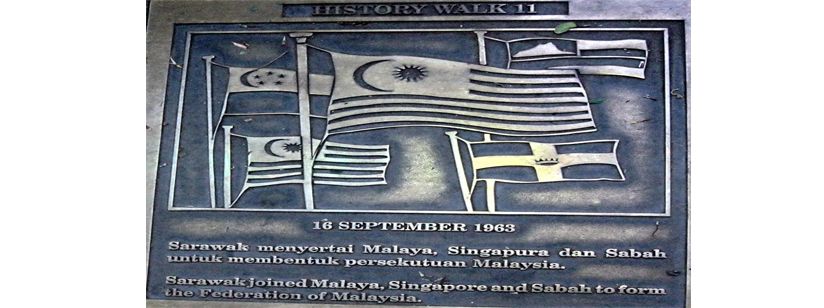
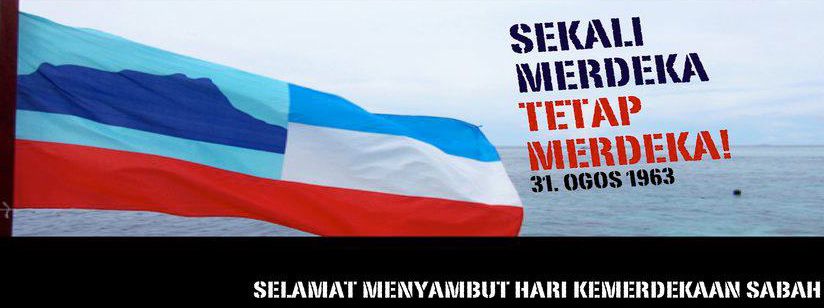
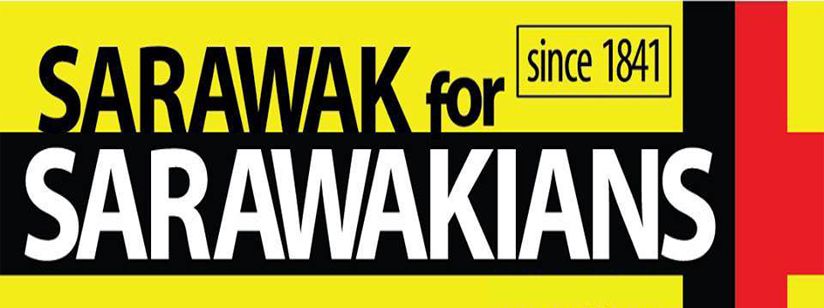



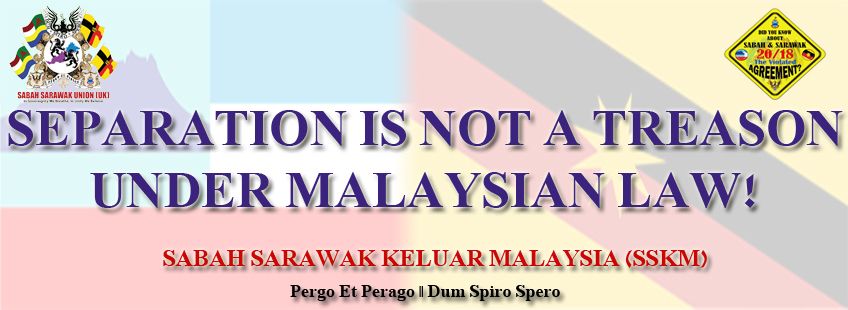
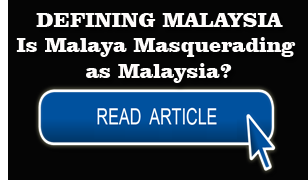
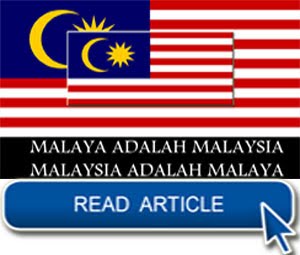
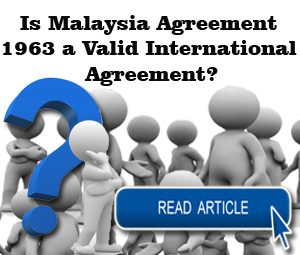

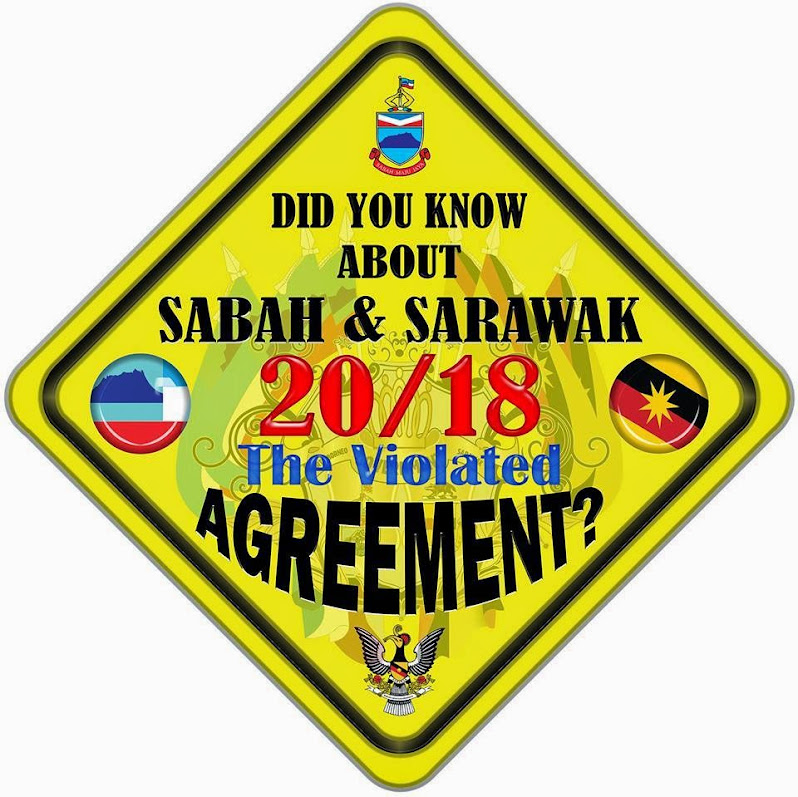
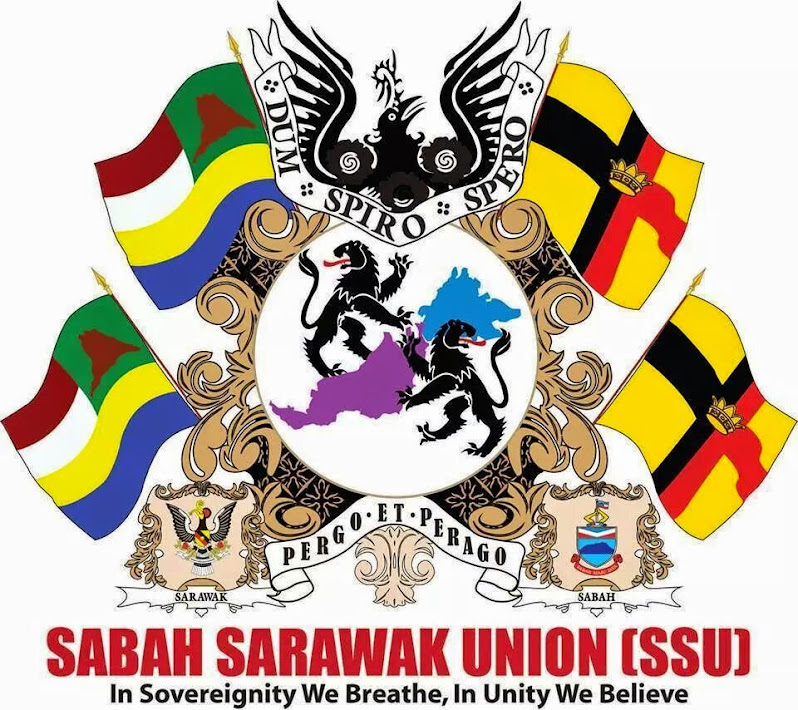
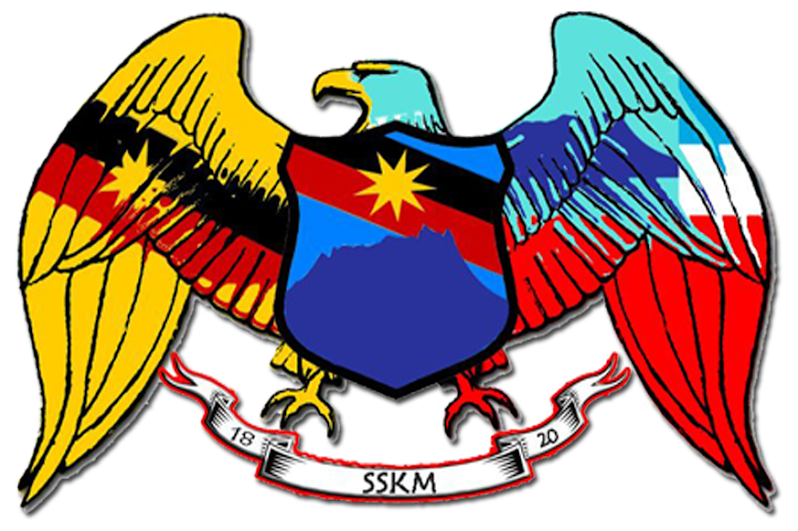
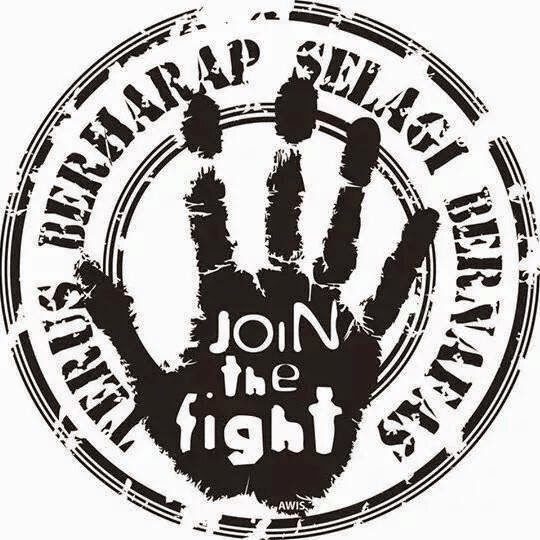
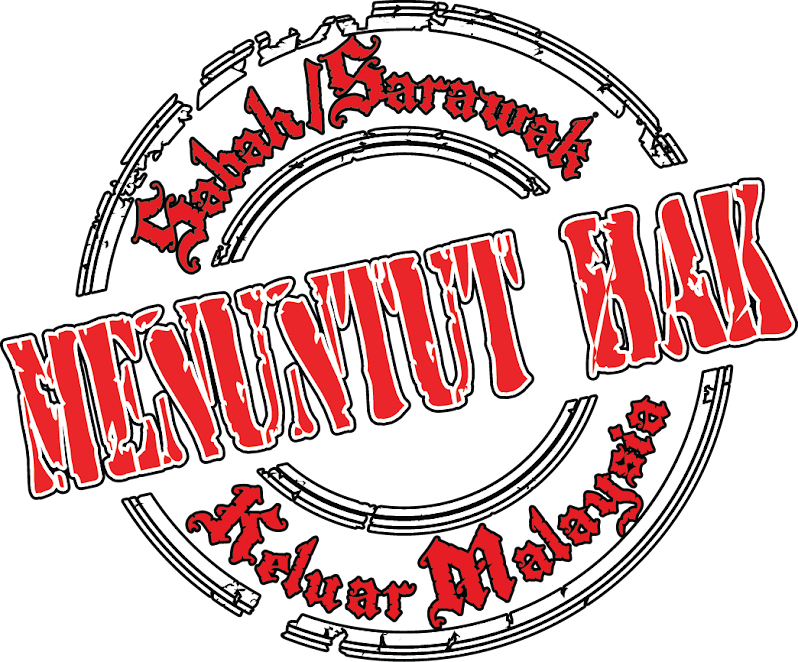
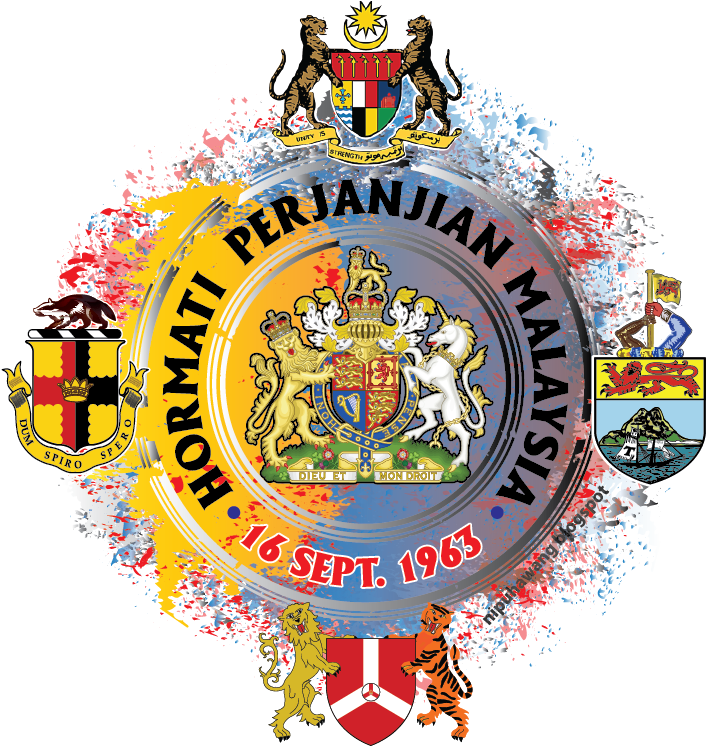

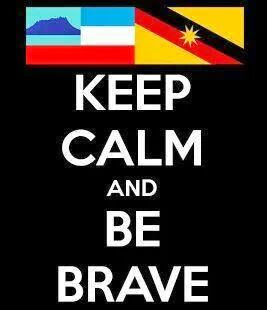
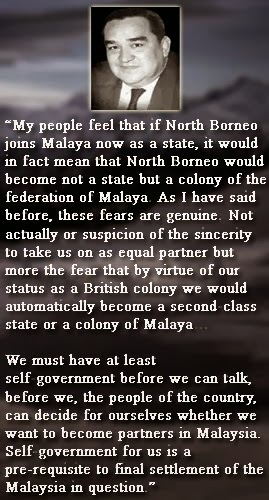
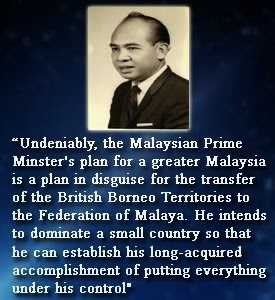



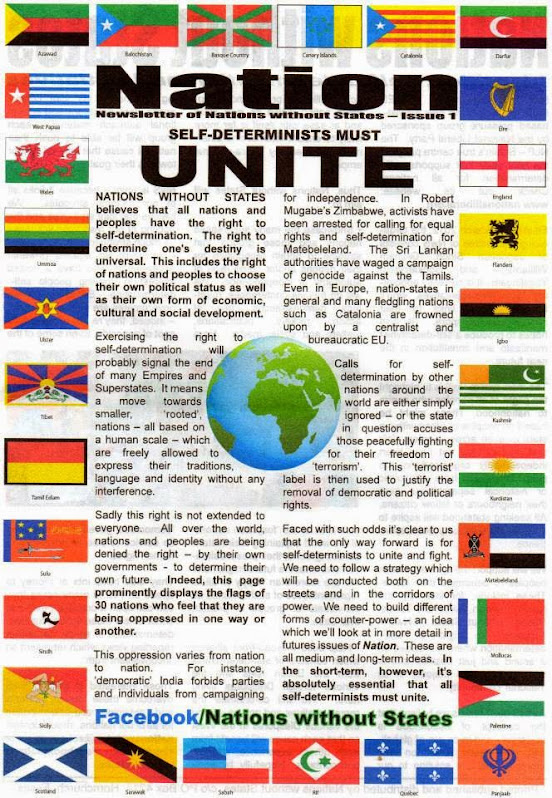

















.jpg)
